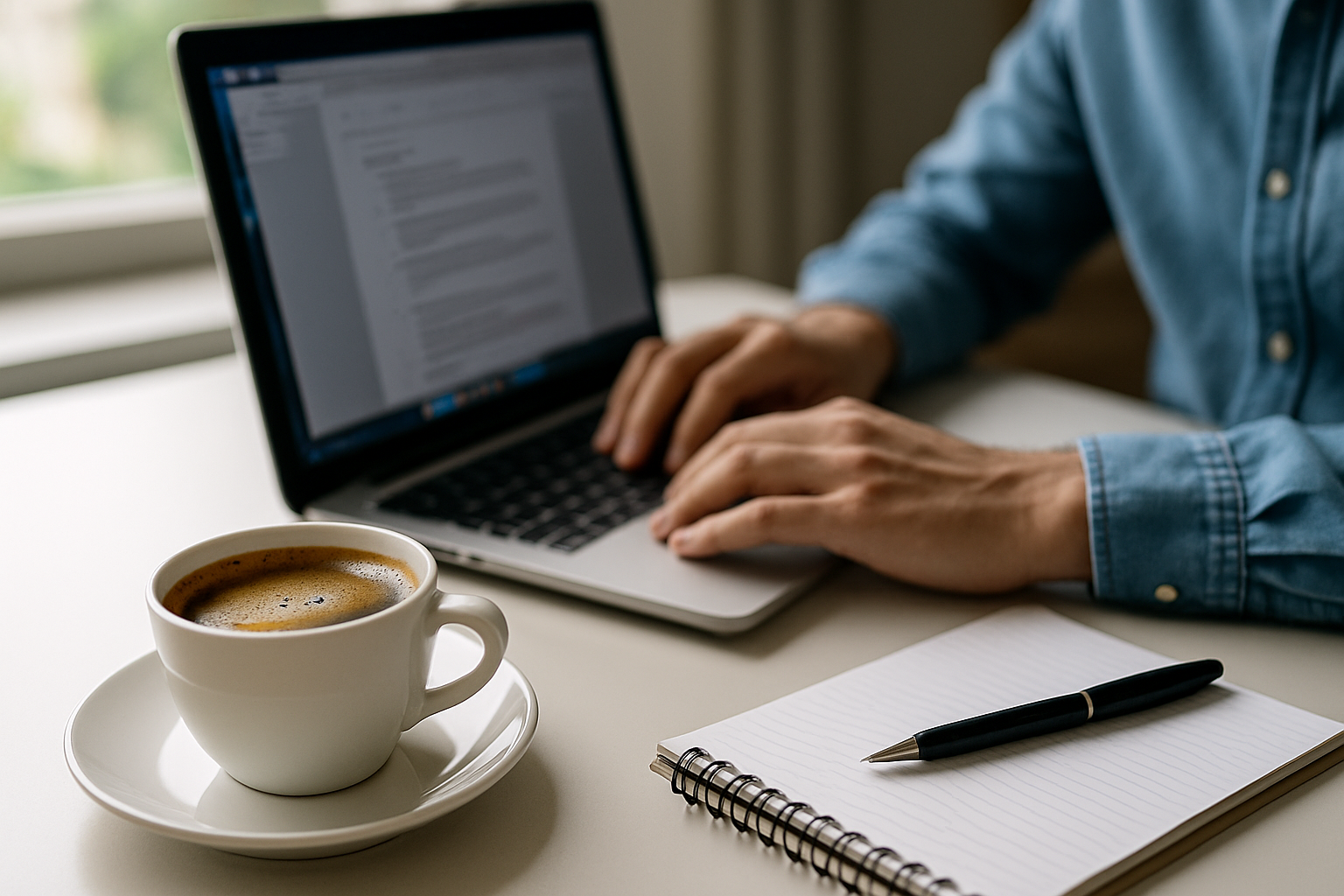Coffee has long been considered the fuel of modern productivity. Whether you’re powering through work emails, studying for an exam, or kicking off a morning brainstorming session, a well-timed cup of coffee can seem like the ultimate companion.
But beyond the cultural habit and personal routine, what does science really say about coffee’s impact on productivity? As it turns out, there are plenty of reasons why coffee helps people focus better, stay alert longer, and get more done—when used wisely.
In this article, we’ll break down how coffee improves productivity, how to avoid common pitfalls, and how to build smart habits around your coffee routine.
The Brain on Coffee: What Happens When You Drink It
The key compound in coffee is caffeine, a natural stimulant that primarily affects the brain. When you drink coffee, caffeine quickly enters your bloodstream and blocks the action of adenosine, a neurotransmitter responsible for making you feel sleepy.
With adenosine out of the way, other stimulating chemicals like dopamine and norepinephrine increase, leading to improved alertness, focus, and even mood.
These changes happen within about 15 to 45 minutes after you drink coffee, depending on your metabolism. That’s why many people feel a noticeable energy and concentration boost soon after finishing their cup.
Cognitive Benefits of Coffee
Caffeine doesn’t just wake you up—it also enhances several mental functions that are critical for productivity. Here are some of the main benefits supported by research:
- Increased attention span
- Faster reaction time
- Improved memory retrieval
- Better problem-solving performance
- Stronger focus during repetitive tasks
These effects are especially useful for knowledge work, creative tasks, and long study sessions. Even small amounts of caffeine can lead to better performance in low-energy or mentally demanding situations.
Coffee and Task Efficiency
One of the most underrated benefits of coffee is how it helps with efficiency. That extra alertness means you can complete tasks more quickly, with fewer mistakes. This applies to everything from typing emails to completing spreadsheets or organizing your day.
When your brain is firing on all cylinders, decisions feel easier, ideas come faster, and you’re less likely to get distracted. That’s the real power of coffee—not just more energy, but more focused energy.
Best Times to Drink Coffee for Maximum Productivity
To get the most from your coffee, timing is everything. Drinking it at the wrong moment can reduce its effectiveness or even interfere with your natural energy cycles.
Here are the best times to drink coffee for productivity:
- 60 to 90 minutes after waking – Your cortisol levels (a natural alertness hormone) are high in the morning. Waiting an hour helps coffee work better.
- Mid-morning (9:30–11:30 a.m.) – Energy may start to dip, making this an ideal window.
- Early afternoon (1:00–2:30 p.m.) – A small boost here can fight post-lunch fatigue without interfering with nighttime sleep.
Avoid drinking coffee too late in the day—usually after 3 p.m.—as it may reduce sleep quality, which ultimately damages productivity the next day.
Coffee and Flow State: Can It Help?
The “flow state” is a mental condition in which you’re fully immersed in a task. You lose track of time, ideas flow effortlessly, and work feels enjoyable. Coffee can help you reach this state faster.
By improving focus, reducing distraction, and enhancing your mood, caffeine sets the stage for sustained deep work. Just make sure you eliminate other distractions (like your phone) so you can use that mental boost to enter a productive rhythm.
Pairing coffee with headphones and ambient music or a tidy workspace can further enhance your chances of hitting that flow.
Coffee vs. Energy Drinks or Soda
Many people reach for other caffeinated beverages, but coffee remains one of the healthiest and most efficient options. Unlike sugary energy drinks or soda, black coffee has no added calories, no high-fructose corn syrup, and often a higher concentration of caffeine per ounce.
You also have more control over what you’re consuming. You can adjust the strength, choose high-quality beans, and avoid unnecessary additives. This makes coffee a smart choice for those who want to be productive and health-conscious.
How Much Coffee Is Too Much?
Moderation is the secret to using coffee for productivity without side effects. Most experts recommend no more than 400mg of caffeine per day, which equals about:
- 3 to 4 cups of brewed coffee
- 2 double espressos
- 1 large cold brew (depending on strength)
More than that can lead to jitters, anxiety, or even a crash in energy levels. If you feel wired, restless, or notice your focus slipping, try reducing your intake or switching to a lower-caffeine option like half-caf or cold brew with more water.
Everyone’s tolerance is different, so find the sweet spot that works best for your body and schedule.
Creating a Coffee Routine That Works
To make coffee part of your productivity system, treat it like a tool—not just a treat. Create a consistent routine that supports your goals.
Here’s a simple productivity-boosting coffee ritual:
- Drink a glass of water when you wake up
- Wait 60–90 minutes, then enjoy your first cup
- Pair it with a focused task—writing, coding, planning, studying
- Take breaks between cups and don’t rely on coffee alone for energy
- Stop caffeine after 3:00 p.m. to protect your sleep
Adding a bit of structure keeps caffeine effective and prevents dependence or fatigue later in the day.
Coffee Breaks as Mental Resets
Coffee doesn’t just improve output—it also improves recovery. Taking short coffee breaks during the day can serve as a mental reset. They allow your brain to rest, reduce mental fatigue, and help you return to your work refreshed.
Use your coffee break as a moment to step away from screens. Go outside for a few minutes, have a conversation, or do some light stretching while enjoying your cup.
These breaks promote well-being, which supports long-term productivity—especially in demanding jobs or during long creative projects.
Avoiding the Midday Crash
Many people feel an energy dip in the early afternoon. Coffee can help you power through this slump, but it’s important to pair it with healthy habits.
Avoid sugary snacks and heavy meals at lunch. Drink water and take short walks when possible. These practices make the most of your coffee boost and keep your brain alert for the rest of the day.
You don’t need a giant refill—just a small, steady boost that aligns with your energy levels.
Beyond the Buzz: Coffee as a Mindset Tool
Finally, coffee is not just about chemistry—it’s about mindset. Having a hot, comforting beverage in hand can signal your brain that it’s time to focus. This psychological anchor can help you transition into work mode more easily.
Over time, you start to associate coffee with creativity, clarity, and progress. That association alone can improve your motivation and mindset, even before the caffeine kicks in.
Make it part of your routine in a way that feels intentional and calming, not rushed or automatic. That’s where coffee’s true productivity power lies.
Final Thoughts: Use Coffee, Don’t Depend on It
When used strategically, coffee can be a reliable and enjoyable way to enhance your productivity. It helps you think clearly, focus longer, and get through the day with more energy and efficiency.
But coffee works best when it supports your lifestyle—not when it replaces healthy habits. Good sleep, hydration, movement, and nutrition are the real foundation of productivity. Coffee is simply the boost.
So next time you pour your morning brew, remember: you’re not just waking up. You’re preparing to get things done—with purpose.

Marcelo Oliveira is a coffee enthusiast and content creator specializing in barista skills, brewing methods, equipment reviews, coffee-related health insights, and fascinating curiosities from the coffee world. With a deep passion for every step of the brewing process, he turns technical knowledge into accessible and engaging content for both beginners and seasoned coffee lovers. Marcelo’s goal is to help readers appreciate the full experience of coffee—from bean to cup.
